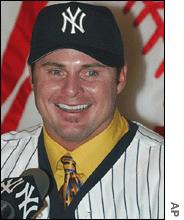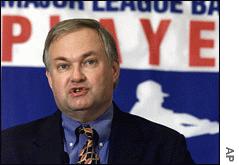|
Dropping the ball
|
 |
December 14, 2001: 3:05 p.m. ET
Major League Baseball's contraction folly kills the chance for needed changes.
A twice weekly column by Staff Writer Chris Isidore
|
NEW YORK (CNN/Money) - The New York Yankees were dethroned this year, but there appears to be no stopping baseball's true perennial champions -- the Major League Baseball Players Association.
But this time the union has won almost without having to fire a shot. The owners, meanwhile, have used up the limited ammunition they had to simply shoot themselves in the foot.
In the six weeks since the expiration of the league's collective bargaining agreement, there have been no talks between the union and management about a contract that would include an increase in revenue sharing among teams and put restraints on salaries.
Those are changes that Commissioner Bud Selig testified to Congress last week are crucial to the game's future. Even the union has signaled a willingness to increase revenue sharing, although not by as much as owners want, and it has agreed in the past to payroll taxes that work like a salary cap to limit a team's total payroll.
Instead the two sides have fought, so far to a draw, over a long-shot goal of the owners -- the closing of two teams.
While baseball continues with the public fantasy that contraction may still occur before 2002, it's clear that there is no chance to hurdle the legal obstacles to such a radical move in time to disperse newly teamless players and set next season's schedule.

|
|
|
Commissioner Bud Selig passed up his chance to stop, or at least delay, the Yankees signing free agent Jason Giambi for $120 million when he decided not to declare a signing freeze this off season. | |
Owners have privately recognized that contraction in 2002 was unrealistic for some time, but had hoped to reach agreement with the union giving them to right to contract teams for the 2003 season. Those negotiations collapsed Thursday, sending the issue to an arbitrator. A loss by management there would give players all the cards they need either to block contraction or win a new contract without a salary cap -- or both.
Meanwhile teams have moved ahead with player signings and trades. Free agents have signed contracts worth $316 million since the end of the season. Take out the deep-pocket Yankees and the other four teams that baseball admits made money in 2001, and the 25 teams which are reportedly suffering from financial distress have managed to find $148 million to sign players. And it's unrealistic to think that many of the big-name free agents still available, such as Barry Bonds, who set the single-season home run record last year, will be signing at bargain prices.
Click here for CNNSI.com's baseball coverage
The contracts reached for next year and beyond mean that even if a labor agreement is reached before opening day, it would be unlikely to include salary caps or an internal tax on payrolls that would apply to the 2002 season. Which means that baseball has virtually guaranteed itself another season of the same economic system it now decries.
| |

|
|
Bud Selig testified to Congress that contraction is only a small part of what baseball needs to be profitable again, but that's where he put all of management's efforts since the end of the season. | |
Ownership could still lock out players in an attempt to win the contract it wants. But the onus for the work stoppage would now fall firmly on management, rather than the union.
A lockout and signing freeze announced at the expiration of the last contract would have sparked far less backlash from fans, assuming a contract could have been settled in time to avoid any loss of games next year. But Selig, in an effort to cushion his contraction announcement, announced that day there would be no lockout or signing freeze, "for now."
A signing freeze is no longer an option. A lockout at this point would cost baseball millions of fans that it has fought to win back since the 1994-95 players' strike. So it probably isn't in the cards either.
There's virtually no chance that the players will go on strike -- they don't have to. The current economic structure of the game suits them just fine. While it's tough to imagine them happily agreeing to an NFL-style salary cap or significant increase in revenue sharing, the fact is that management hasn't really tried to make progress on those issues, instead concentrating on contraction.

|
|
|
Union chief Don Fehr is seeing his side come out on top once again without having to go on strike. | |
"In all due respect, Commissioner Selig has no idea what kind of agreement he could have reached because he didn't give it a chance," Don Fehr, the union's executive director, said in a press conference the day Selig testified before Congress about the game's economic condition.
Contraction was always a relatively minor gain for the economics of the game -- saving the remaining 28 teams about $3 million each in revenue they now share with Minnesota and Montreal, the two clubs making the biggest draw on the league's resources, and only at a cost of hundreds of millions needed to buyout those two franchises. Would the owners be better off if they had passed on the idea and tried for a better contract? They couldn't be any worse off.
When next season rolls around and baseball has neither contraction nor a new economic system, Selig and other owners will again try to blame the union, elected officials who fought contraction plans and just about everyone else. But this will be a self-inflicted wound. 
Click here to send mail to Chris Isidore
|
|
|
|
|
|

|

